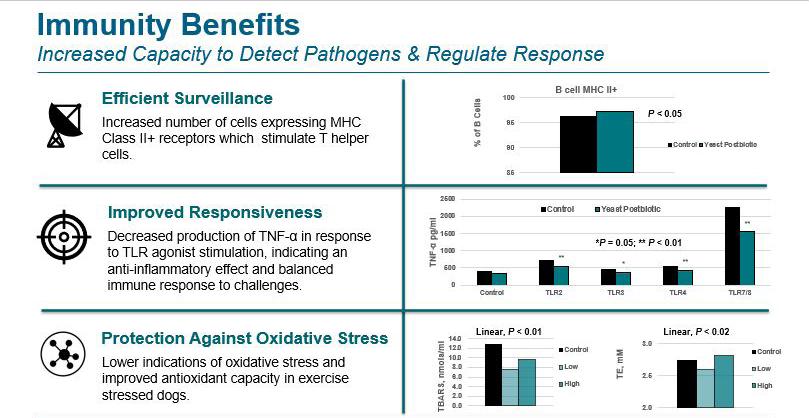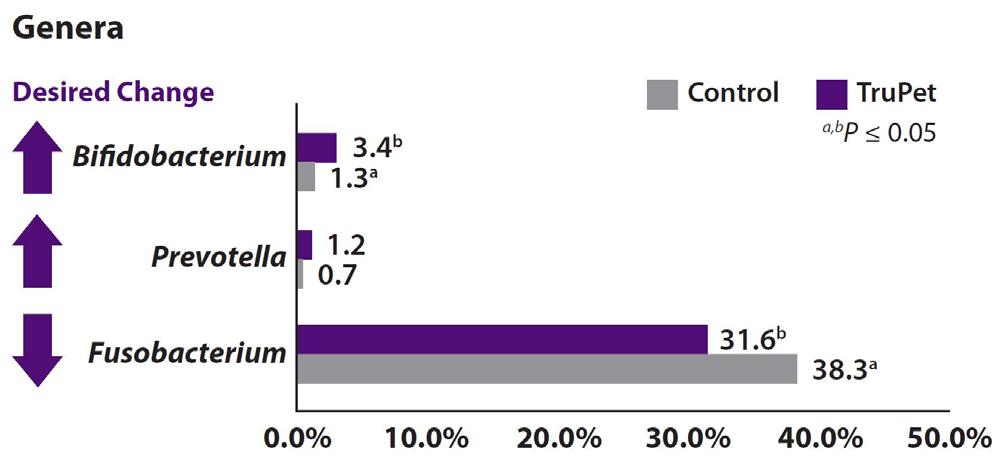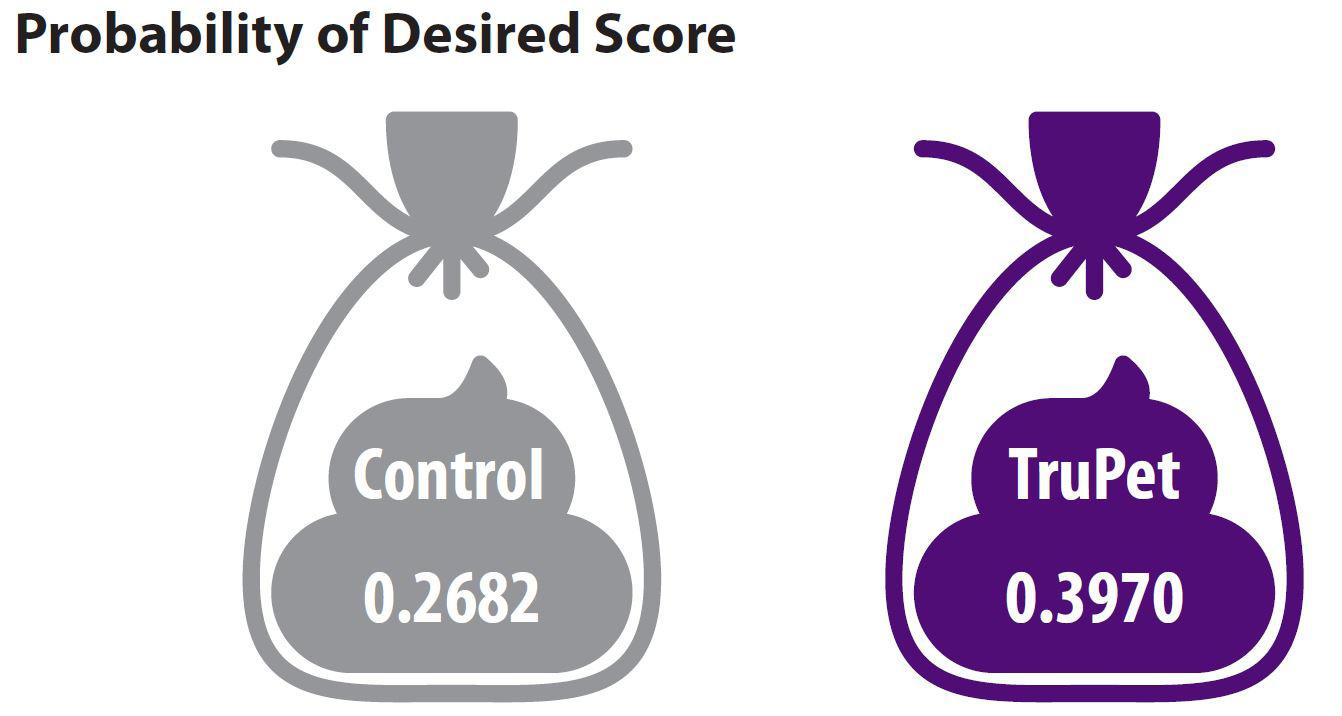
4 minute read
The Power of Postbiotics Giving Pets the Best Health Support
With Alana Harvey-White, Commercial Manager Pet and Equine, Cargill
The development and availability of functional ingredients are contributing to enriched pet food diets. Included in these ingredients are pre- and probiotics, and now the newly defined postbiotics.
The core function of these is the association of microbes and the
foods they feed on, which provides a favourable outcome. products are backed by research that includes more than 425 controlled research studies and 120 peer-reviewed publications across all livestock, pet and aqua species.
Using innovative fermentation techniques and proven analytical methods, the company produces postbiotics in a highly controlled environment to ensure a consistent high quality and reliable product. They are produced through the precise fermentation of inputs – typically bacteria and yeasts and a proprietary nutrient-rich media – to generate a blend of more than 20 beneficial metabolites. These metabolites include
amino acids, vitamins and short-chain fatty acids, which are known to support health.
They are also proven to be stable through all typical manufacturing processes, such as pelleting, extrusion, retorting and aseptic packaging. “This is an advantage compared to many other supplements, and this is why the innovation of postbiotics has been a game-changer particularly in pet food,” adds Mrs Harvey-White.
During the past 18 months, a postbiotic has been more accurately defined. The International Scientific Association of Probiotics and
Prebiotics (ISAPP) describes a postbiotic as ‘a preparation of inanimate microorganisms and/or their components that confers a health benefit to the host’.
“Postbiotics may contain intact inanimate microbial cells and/or microbial cell fragments or structures with or without metabolites as end products,” says Alana Harvey-White. “They differ from pre- and probiotics in that they are the product of the two, when produced in the animal.”
Prebiotics are generally fibres found in plant cell walls. They serve as fuel for beneficial organisms in the gut.
Probiotics, such as live beneficial bacteria and yeasts, are found in the gut and provide ‘factories’ that can use prebiotics to make metabolites. The metabolites (postbiotics) are then utilised by the host animal, and have been shown to be highly beneficial to its health and well-being.
“The effectiveness of in vitro pre- and probiotics, and therefore postbiotics, can be impacted by the health and stress status of the pet,” adds Mrs Harvey-White. “The great benefit of a postbiotic supplement is its consistency and stability.”
Diamond V, a Cargill company, has been developing and producing ingredients, now defined as postbiotics, for more than 75 years. Its First for pets
Cargill’s Diamond V developed and marketed the first such product for pets, called TruPet. TruPet has been proven to be effective in supporting immunity, digestion and vitality in dogs.
“It is a leader in fermentation and postbiotic technology,” says Mrs Harvey-White. “TruPet contains a unique blend of bioactive compounds that work with the pet’s biology to support beneficial bacteria and balance the gut microbiome. The significance of postbiotics in pets, as shown by trials using TruPet, is more active dogs, a healthy digestive system with improved gut microbiome and less smelly faeces, and a better-supported immune system,” she adds

Figure 1: Antioxidant support and immunity impact of Cargill’s TruPet postbiotic vs a control
Figure 2: TruPet vs Control diets – effect on digestive and gut health Figure 3: Vitality benefits of feeding Diamond V postbiotic TruPet

TruPet put to the test
Species-specific trials show that the postbiotic additive supports immunity and promotes gut and overall health in dogs.
Trial results showed that dogs fed a diet with TruPet had lower levels of key indicators that are known to increase when the immune system is activated, including white blood cells, neutrophils, TBARS and TNF-a.
Figure 1 shows the impact of including the TruPet postbiotic on antioxidant support and immunity.
A similar positive effect was seen in gut health where TruPet was included in dog diets. There was a beneficial shift in gut microbiota compared with dogs fed the control diet, as shown in Figure 2. Figure 2 also shows that dogs fed on a TruPet diet were 50% more likely to have a desirable faecal score, reflecting improved digestive and gut health.
“Where the gut health and immune systems are functioning optimally, dogs have more energy for activities such as playing and running,” adds Mrs Harvey-White.
A 2018 study showed that dogs fed diets that included the TruPet postbiotic were 15% more active than control dogs when running a set distance following a trainer’s vehicle. These results are shown in Figure 3.
Cargill’s postbiotics have been proven to be highly appetising with food supplements containing its postbiotic preferred almost 2:1 compared with the control product.
“Postbiotics should be considered a valuable part of pet nutrition,” adds Mrs Harvey-White. “Products like TruPet, which have been proven to support a strong gut and promote a healthier microbiome, can bring real benefits to the overall well-being of our pets.”
TruPet was launched in Europe in 2021. It is a consistent product used in products to promote a healthy digestive system via the gut microbiome and an effective immune system, leading to healthy, active pets. TruPet is cereal-free, GMO-free and scientifically proven, and it is stable through processing.
Other postbiotics from Diamond V for pets include Epicor Pets, for use in pet supplements and treats, and TruEquine for use in equine diets. “These all use the postbiotic technology developed by Diamond V to bring advantages to pet and equine wellbeing and performance,” adds Mrs Harvey-White.













